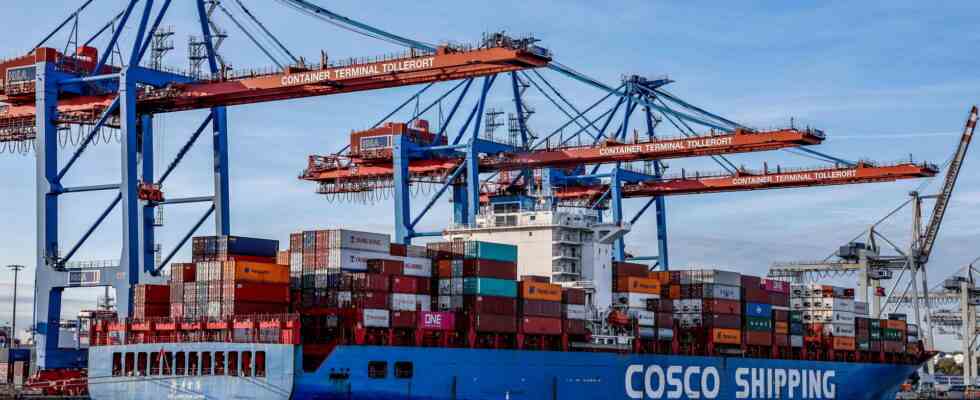Exclusive
Status: 05.12.2022 07:30 a.m
The entry of the Chinese state-owned company Cosco at the port of Hamburg could be followed by joint projects in other European countries. According to research by NDR and WDR from an internal document of the federal government.
Angela Titzrath has made no secret of her conviction that China and Hamburg should grow closer together in the future. During a delegation trip to Shanghai in August 2019, the head of Hamburger Hafen und Logistik AG (HHLA) spoke of the economic opportunities that would arise for the Hanseatic city through increased cooperation and interdependencies. According to reports at the time, according to Titzrath, Hamburg should be the “end of the new Silk Road”. The trip was led by Hamburg’s Mayor Peter Tschentscher (SPD).
Three years later, they are on the verge of moving closer together: China’s state shipping company Cosco could soon become a shareholder in the Port of Hamburg. The negotiations are ongoing. As is now evident, this could only be the beginning of a larger-scale German-Chinese cooperation elsewhere in Europe. This is the result of an internal analysis by the federal government, which refers to three agreements between Cosco and the terminal operator HHLA in recent years.
According to the German government’s analysis, both should strive for a strategic partnership that could also extend to the Baltic Sea and Mediterranean regions. In an internal agreement, HHLA is said to have considered future participation in a Cosco terminal in the Mediterranean as early as 2020 – for example in Piraeus, Greece, where Cosco is the majority shareholder.
No comment on “Market Rumors”
According to the paper from the Federal Ministry of Economics, the companies are said to have also agreed in a shareholder agreement to look for an opportunity to participate in a terminal in Poland. According to internal information, the ports in Gdansk and Gdynia could be considered. Cosco is already involved in several European ports, but so far not in the Baltic Sea region.
The Federal Ministry of Economics did not comment on specific inquiries. It announced that it did not want to comment on business decisions like those of HHLA. HHLA, in turn, denied that it had considered any plans for Poland with the Chinese partner in the shareholder agreement. “That’s not true,” said a spokesman.
Regarding the considerations for the Mediterranean, it was said that “market rumors” are generally not commented on. Regarding the question of a “strategic partnership”, the spokesman replied that the content of contracts and agreements with partners was not publicly discussed.
Beyond Cosco’s intended participation in Tollerort, there are no agreements on further projects – at least not binding ones. Cosco did not respond to questions.
“Potential for Blackmail” Warning
Cosco was originally supposed to have a 35 percent stake in the operator of the container terminal in Tollerort in the port of Hamburg. The German government then approved a 24.9 percent stake in the Chinese company at the end of October. Within the federal government, the chancellor’s office prevailed against considerable resistance NDR and WDR had researched. The six responsible ministries wanted to ban the entry completely because China would then have too much influence and “potential for blackmail”.
It is not yet known whether HHLA and Cosco will enter into the new deal and to what extent previous agreements will continue to apply.
Two agreements
The two companies are said to have concluded two so-called “Memoranda of Understanding” (MoU) in recent years – one in August 2020 and a second in September 2021. According to the government, the documents are intended to “establish a common understanding of the parties to possible future cooperation projects in the within the framework of a ‘strategic partnership'”. However, the agreements are “for the most part legally non-binding”.
According to the analysis by the federal government, only that aspect of the memorandum of 2021 should be legally binding, according to which Cosco promises the greatest possible efforts to utilize the Hamburg terminal. Cosco is already the most important customer at the container terminal in Tollerort (CTT). In 2021, the proportion of volume handled there was 65 percent and 70 percent of turnover.
Joint logistic projects
In both documents of the companies, the common understanding should be recorded that there should be further cooperation between HHLA and the Chinese group Cosco in other areas in the future. These include rail transport or the development of other logistics projects. Both documents should also contain references to the “New Silk Road” for other possible projects.
This major project is about China’s goal of building trade and infrastructure networks far beyond its own country. “China is attempting to establish a permanent presence at strategic points in the world’s maritime infrastructure,” the government analysis said. Cosco plays a key role in this.
HHLA, on the other hand, has pointed out in the past that it sees the “Silk Road Initiative” as an opportunity and wants to “help shape it entrepreneurially”, as the Hamburg terminal operator’s company magazine says in 2019. HHLA also refers to its acquisition of a multi-purpose terminal in Muuga in Estonia, which according to HHLA was discussed as the northernmost point of the “Silk Road”.
HHLA wants to “help shape”
When asked, HHLA now explained that the “Silk Road Initiative” is viewed as an instrument that better connects Asia and Europe. “As a European logistics service provider, HHLA wants to participate in and help shape a strong European network,” said a spokesman.
The federal government is currently working on its own China strategy. Investments in ports also play a role in the Federal Foreign Office’s draft. These are of “particular sensitivity”. The “Silk Road Initiative” is an “important tool for China to expand its political and economic influence in many countries”. The Federal Foreign Office had resisted Cosco’s entry into Hamburg until the very end. The attitude was even recorded in the federal cabinet in a memorandum.

